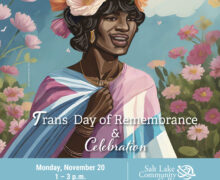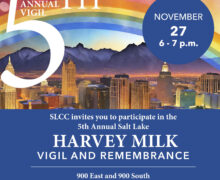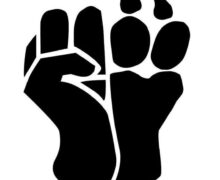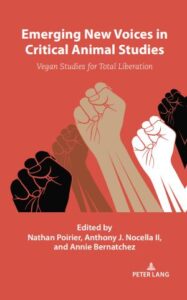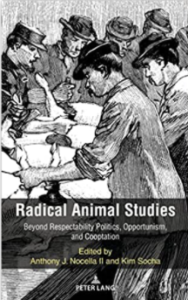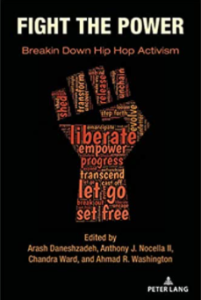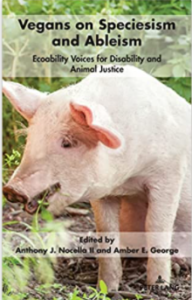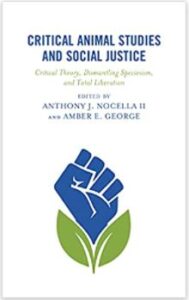7th Annual Ecoability Conference–July 2, 2021
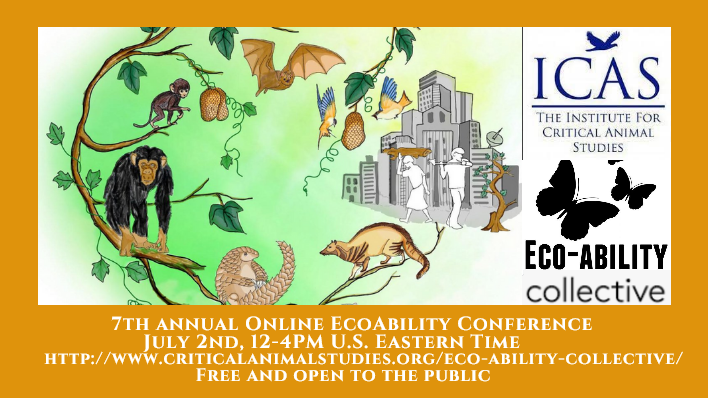
Get ready for this year’s annual ecoability conference! In this time of climate-change-and-animal-agriculture-induced zoonotic diseases and disabilities, wars and poverty both causing and aggravating disabilities, and community-based solutions, this year’s conference addresses all of that and more! Featuring speakers listed below, with Laura Schleifer, ICAS Total Liberation Campaign Director, as moderator.
Watch the video of the entire conference here: 7th Annual Eco-ability conference – YouTube
CONFERENCE SCHEDULE
12:00 PM – 12:05 PM
Laura Schleifer
Opening Remarks
Abstract: In this time of plague, war, mass inequality and ecological catastrophe, an ecoability analysis has never been more needed. Covid-19 has killed millions and caused countless others to develop long-term–possibly permanent–debilitating health conditions, yet almost no one is discussing its zoonotic origins–and more specifically, how the human domination over and exploitation of other animals and nature is the cause of this pandemic, as well as being at the root of the global ecological crisis on the whole. Additionally, forms of violence and oppression within human society are both causing and magnifying existing disabilities for humans and other animals alike, and creating an unlivable planet. At a time when industrial Capitalist societies are striving to get “back to normal” even though ‘normal’ was the problem in the first place, what can a disabled-led movement that examines the diversity and interconnections among nature, ability, and animals and challenges social constructions, binaries, and ideologies of domination teach us about rethinking societal conceptions of ‘normalcy’? This year’s conference will focus on the answer to that question.
Bio: Laura Schleifer (she/her) created the word ‘artivist’ (artist-activist) to describe her vocation. An NYU Tisch graduate (BFA, Drama), she’s toured the Middle East with a theater/circus troupe, taught in China, Nicaragua, and at Wesleyan University’s Green Street Arts Center, performed off-Broadway, and arts-mentored homeless/targeted youth. Her screenplay, The Feral Child, was a Sundance Lab finalist. Her essays appear in The Leftist Review, Project Intersect, The New Engagement, Forca Vegan (current issue), and an upcoming Black Rose Books Kropotkin anthology. Currently, she’s writing a book, Liberating Veganism, for Vegan Publishers. Laura is also the Institute for Critical Animal Studies Total Liberation Director and co-founder of Plant the Land, a vegan food justice/community projects team in Gaza.
12:05 PM -12:40 PM
Geertrui Cazaux
Hero or ally? About white, abled and human saviorism
Abstract: Drawing on examples and critiques of white saviorism and the abled savior trope, I will explore whether there are parallels in animal advocacy, in the form of human saviorism. How can we recognize human saviorism, and how can we go beyond being a savior, to being an ally, in solidarity with other animals. Presenting stories of animal resistance to highlight their agency can play a key role here.
Biography: Geertrui Cazaux (she/her) has been advocating for animal liberation since 25 years. After her doctoral research on anthropocentrism and speciesism in criminology, she worked in youth care and as a policy advisor. She is retired because of chronic diseases and has a microsanctuary where she takes care of adopted animals. She is the editor of Mensen en andere dieren (2001) and Een ander soort zuster (2020) and writes about veganism and animals rights on Graswortels, Brugesvegan and about the interconnections between ableism and speciesism on Crip Humanimal.–
https://www.graswortels.orghttps://brugesvegan.comhttps://criphumanimal.org
12:40 PM – 1:15 PM
Anas Arafat
Ecoability in Occupied Palestine: How Bombing, Sanctions and Other Human Rights Crimes Cause and Compound Disability
Abstract: Thanks to long-term Israeli sanctions blocking Gaza from being able to access sufficient food, medicine, clean water, electricity, gasoline, building supplies, and every other basic necessity of life, Gaza was already dealing with one of the world’s worst human rights crises even before the intense Israeli bombing campaign this past May. In such circumstances, how are disabled people impacted? Moreover, how do such circumstances cause disabilities even in cases where people were once fully able-bodied? This talk will discuss the situation for disabled people in Gaza, and how they are impacted by the ecological conditions they live in—the water shortages, the toxins left by bombs, the mental and physical health conditions caused by living under foreign military control in the ‘world’s biggest open-air concentration camp’, where people are unable to enter and exit their own land even for desperately-needed medical treatment without Israel’s permission. It will also discuss how Plant the Land Team, an innovative new vegan food justice and community projects team created by and for Gazans, is using grassroots mutual aid efforts to serve the needs of the community—and specifically, its disabled members—to help support them through this crisis on both a humanitarian and ecological level.
Biography: Anas Arafat (he/him) is a Palestinian lawyer and humanitarian aid activist based in Gaza. In 2019, he co-founded Plant the Land Team, a vegan food justice and community projects team with Laura Schleifer, Total Liberation Campaign Director at the Institute for Critical Animal Studies. Plant the Land Team buys and distributes vegan food, plants food forests, and provides Gazan farmers with seeds and planting tools. Projects also include providing plant-based insulin to diabetics, providing warm winter coats and blankets, building village water wells, and rebuilding homes destroyed by Israeli bomb attacks.
1: 15 PM – 1:50 PM
Lee Ann Thill, PhD, ATR-BC, LPC
Art-based Ecoability Exploration of Disordered Eating, Body Image Distress and Gender with Vegan Women
Abstract: Women who align with other animals have long been maligned and pathologized. A modern manifestation of this occurs when disordered eating behaviors (DEB) and body image distress (BID) in women are conflated with veganism in popular culture and in some healthcare spaces. Vegans are rightfully quick to differentiate, but the reality is that DEB/BID and veganism can overlap, and the relationship is nuanced and dynamic with individual variations. To better understand the experience of vegan women with DEB/BID, four women participated in a series of individual art-making and discussion sessions. This art-based qualitative study also incorporated researcher response art and edited videos of the participant sessions. Analysis revealed six essential ideas that characterized the women’s experience, from which a set of theoretical models of the mechanisms between femaleness, veganism, and DEB/BID is proposed.
Biography: Lee Ann Thill, PhD, ATR-BC, LPC (she/her) is an artist, art therapist, and professor who recently completed her doctorate in expressive therapies at Lesley University. She was active in health advocacy spaces for many years, organizing international art-based initiatives for patient empowerment. She became engaged with animal rights while working on her doctorate, widening the scope of her research and activism. Her current research and writing is an interdisciplinary art-based exploration of body image, food relationships, veganism, disability, gender, sexuality, interspecies relationships, and imagery through a critical animal studies lens. Lee Ann lives in New Jersey with her husband, three dogs, two cats, and a blind sparrow. She manages multiple health conditions, buys too many books, and makes fabulous chili.
1:50 PM – 2:25 PM
Jessica Rowshandel
How Do You Hike in a Wheelchair? And Other Ecoability-Related Questions. Fieldwork in the Sciences is Inaccessible and Disrespectful.
Abstract: The sciences have a long history of going into “the field” (nature), making observations, and “collecting specimens”. Originally an extension of imperialism, field work is often done with a sense of entitlement and ownership over the land and objects stolen from that land, with great disregard for the people (human and non-human) and flora inhabiting that land. In addition, the scientists themselves assume able-bodiedness and neurotypicality of fieldwork participants. As a disabled and neurodivergent geosciences student required to complete three 2-week geology field trips in order to graduate, I have been faced with many challenges related to my disability, neurodivergence, and non-human-animal-centered veganism. Fieldwork in the geosciences often involves camping and hiking for long hours, and sometimes under harsh weather conditions. I have been fortunate that we have, so far, slept in fairly comfortable enough (to me) cabins, but tent camping has been part of trips that preceded me and is common in the field, in general. I believe I was the first vegan to participate in my school’s fieldwork program, and was fortunate that I was able to easily obtain vegan food most of the time. However, that’s not always the case. In addition, these trips are emotionally taxing and challenging for someone, like myself, with a history of mental illness. The trips also involve a high level of socialization and a learning environment that can be difficult with learning styles that are not compatible with fast-paced auditory processing. Despite these challenges, this is not hopeless.Making field work both respectful and accessible is possible. In recent years efforts have developed to address some of these concerns.
Biography: Jessica Rowshandel (they/she) is disabled & neurodivergent. They are a former social worker and switched careers in 2015. They have nearly 20 years of experience working for non-profits, including after their career change, advocating for NYC’s unhoused, supporting people with lupus, and helping arts and queer organizations with their technology operations. They have a BA in forensic psychology from John Jay College and an MSSW in social work from Columbia University. They are also currently pursuing a BS in geosciences at Chadron State College. Jessica is passionate about social justice and has used writing and volunteering as ways to express this passion outside of the nonprofit industrial complex. They have been involved in non-human advocacy for over 10 years. This includes the presentations Housing Discrimination and Pets of the Homeless presentation (Albany Law School) and Pro-Vegan Self-Care Racial Justice Activists (Sistah Vegan Conference: The Vegan Praxis of Black Lives Matter), and volunteering for In Defense of Animals.
2:25 PM – 3 PM
Kelsey Atkinson
Working in a Slaughterhouse – An EcoAbility Analysis from Worker Interviews & Reviews
Abstract: This presentation provides insight from a personal lens into the working lives of slaughterhouse workers. Through anonymous interviews and online reviews, this presentation shines a light on injustices within the slaughterhouse industry, and explores ways to improve the lives of workers. The solutions presented vary in scale from the human resources department level, up to state and federal regulations, as well as larger societal discussions. The findings of this research provide further evidence for slaughterhouses planting themselves in impoverished areas where workers have few other employment options. Findings also point to the pervasiveness of unprofessional and disrespectful management, as well as discriminatory practices in the workplace. Listening to and understanding the plight of slaughterhouse workers is a critical step in determining key issues, creating effective solutions, and supporting worker justice.
Biography: Kelsey Atkinson (they/she) has a Masters in Public Administration from DePaul University and conducted original research on the plight of slaughterhouse workers. They are local to Chicago and spent nearly the past decade in community organizing circles centered on animal rights, racial justice, and immigrant/worker rights. She co-founded Chicago Animal Save and helped to organize slaughterhouse vigils, animal rescues, and numerous events to draw connections between the intersections of human and animal liberation struggles. More recently they organize with Rising Tide Chicago in solidarity with Indigenous groups demanding to Stop Line 3, a tar sands pipeline.
3 PM-3:35 PM
Ava HaberkornHalm
Title: An Ecoability Response to Ableism in the Food Justice Movement
Abstract: Rooted in lived experiences, the speaker identifies and explores general connections between the ableism found in the Food Justice Movement and eugenic logic. It is argued that these different socio-political arenas fundamentally revolve around the same central theme and conflict, (the disabled body/mind vs the socialized natural environment), and therefore, both exemplify and perpetuate that. Finally, the speaker envisions a way to a way to interrupt this ableism through a mix of community based environmental work and Eco-Ability principles.
Bio: Ava HaberkornHalm (she/her) is a disability and food justice activist, disabled woman, independent scholar, and founder of the Inclusive Food Justice Education Network. Her current work is informed by her own experiences of ableism and those of the greater disability community. It focuses on developing inclusive community gardens, advocating for inclusion in community growing spaces, and addressing ableism in the food justice movement. She has consulted with a variety of food justice organizations in SE Michigan and regularly speaks on disability and food justice at conferences and local events.
3:35 PM – 4:10 PM
Leroy Moore
The EcoAbility of Krip & Poverty Scholars Who Have a Deep Relationship To Mother-Nature But Are Always Left Out!
Abstract: Noted Disability Studies Scholar and ‘Krip-Hop Nation’ founder Leroy Moore will talk about how disability justice and poverty scholarship can and must be included in the environmental justice movement–and about why the environmental justice movement has left out these people and their knowledge.
Biography: Leroy F. Moore Jr. (he/him), is the multiple award-winning founder of the Krip-Hop Nation. Born with cerebral palsy in 1967, since the 1990s has written the column “Illin-N-Chillin” for POOR Magazine. Moore is one of the founding members of National Black Disability Coalition and is an activist around police brutality against people with disabilities. Leroy has started and helped started organizations like Disability Advocates of Minorities Organization to Sins Invalid to Krip-Hop Nation. His cultural work includes the film documentary, Where Is Hope, Police Brutality Against People with Disabilities, spoken-word CDs, poetry books and children’s book, Black Disabled Art History 101 published by Xochitl Justice Press. From Harvard to The Whitney Museum to Media Engagement for Disability in Johannesburg South Africa, Leroy Moore has more than twenty years of activism, journalism, writing, lecturing on race and disability. Moore is also a Black disabled poet, activist and the author of five books on Black Disabled issues from poetry to children books to his recent graphic novel, Krip-HopVol. 1 that was published in 2019 by Poor Press. After writing Black Disabled Art History 101 in 2017, he was visited more often by Black disabled ancestors who pushed him to write his recent book, Black Disabled Ancestors under Poor Press of Poor Magazine. Also, in August of 2020 Leroy and Naru Kwin released their film on Blind Joe Capers who changed the Oakland’s music scene in the 80’s and 90’s!. Fall 2021 Leroy starts his Ph.D. in Anthropology at UCLA.


